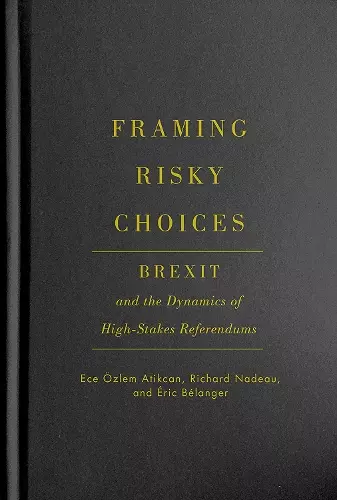Framing Risky Choices
Brexit and the Dynamics of High-Stakes Referendums
Eric Belanger author Richard Nadeau author Ece Özlem Atikcan author
Format:Hardback
Publisher:McGill-Queen's University Press
Published:3rd Jun '20
Currently unavailable, and unfortunately no date known when it will be back
This hardback is available in another edition too:
- Paperback£29.99(9780228000808)

Why the British public voted - against all expectations and in the face of economic uncertainty - to leave the European Union, explained from a comparative perspective.
The majority of policymakers, academics, and members of the general public expected British citizens to vote to remain in the European Union in the 2016 referendum. This perception was based on the well-established idea that voters don't like change or uncertainty. So why did the British public vote to take such a major economic risk? Framing Risky Choices addresses this question by placing the Brexit vote in the bigger picture of EU and Scottish independence referendums. Drawing from extensive interviews and survey data, it asserts that the framing effect – mobilizing voters by encouraging them to think along particular lines – matters, but not every argument is equally effective. Simple, evocative, and emotionally compelling frames that offer negativity are especially effective in changing people's minds. In the Brexit case, the Leave side neutralized the economic risks of Brexit and proposed other risks relating to remaining in the EU, such as losing control of immigration policy and a lack of funding for the National Health Service. These concrete, impassioned arguments struck an immediate and familiar chord with voters. Most intriguingly, the Remain side was silent on these issues, without an emotional case to present. Framing Risky Choices presents a multi-method, comparative, state-of-the-art analysis of how the Brexit campaign contributed to the outcome. Uncovering the core mechanism behind post-truth politics, it shows that the strength of an argument is not its empirical validity but its public appeal.
ISBN: 9780228000792
Dimensions: unknown
Weight: 454g
248 pages